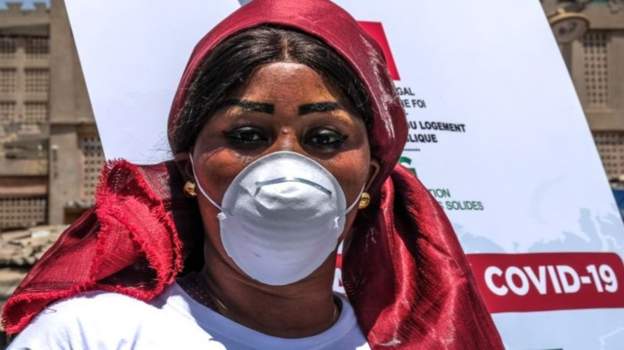Senegal has cancelled giant celebrations to mark its 60th anniversary of independence from France because of coronavirus.
The West African nation has 140 active cases of Covid-19 - 66 people have recovered and one person has died over the last month.
It has become one of the countries in Africa leading the fight against coronavirus.
As well as declaring a state of emergency, closing its land, air and sea borders to all but essential goods traffic and banning public gatherings, it has focused on tracking potential infections.
Anyone who has been in contact with an infected person has been put up in a hotel and quarantined for 14 days.
The mantra of the World Health Organization (WHO) is “test, test, test” - but tests are time-consuming and expensive, something Africa can ill afford.
That all may be set to change as Senegal is working with a UK company to develop a quick, simple, $1 (£0.80) test.
Validation tests are under way.
As the test can be performed without any need for electricity, it would be of particular use for Africa’s rural communities, which often do not have access to power.
More controversially, Senegal has been pioneering the use of an anti-malarial drug, chloroquine, to treat coronavirus patients.
The WHO says its effectiveness has not been proved; other respected medical institutions have warned against the hype surrounding the drug.
But Abdou Latif Coulibaly, Senegal’s culture minister and government spokesman, told the BBC that doctors in the country had seen what he described as “rapid improvement” in patients treated with chloroquine.
“The WHO is not going to tell us what to do,” he insisted.
“Our doctors can do what they want.”
Although with nearly 8,000 confirmed cases across the continent, Africa has not yet been hit as hard as other places there are fears that if and when Covid-19 takes hold, it will be a catastrophe.
Initiatives such as the cheap test Senegal is developing will be essential in saving lives on a continent with weak healthcare and sanitation systems, and populations often vulnerable to disease because of underlying conditions such as malnutrition, tuberculosis and HIV/Aids.
Latest Stories
-
Newmont’s Akyem Vocational Institute unveils battery-powered fufu machine at graduation ceremony
7 seconds -
Newmont reinforces cultural heritage commitment in host communities
9 minutes -
Oti Region records over 10 road accident deaths from January to September this year
14 minutes -
Ecobank Ghana inaugurates ‘Ecobank Retirees Association’: A legacy of fellowship and service
19 minutes -
Optimal OMD appoints Taniya Mondal as MD
34 minutes -
Lekzy DeComic hailed for masterful emceeing at OB Amponsah’s comedy show
35 minutes -
Premier Care Hospital sparks joy with second annual nine lessons and carols night!
35 minutes -
OB Amponsah fills 4,000 capacity Bukom Boxing Arena with comedy special
40 minutes -
Bridging digital and human intellect: Africa’s Path from 4IR to 5IR
45 minutes -
How Newmont’s Learnership Programme empowered Dorcas Oppong to achieve her dreams
52 minutes -
Kenya’s Ruto embraces rivals to shore up support
58 minutes -
The student who blew whistle on Kenya airport controversy
1 hour -
PwC Ghana spreads festive cheer with inaugural Season of Smiles
1 hour -
CETAG threatens indefinite strike from Dec 31 over government’s ‘broken promises’
1 hour -
Excitement builds for ‘Beyond the Icons’: A celebration of African legends’ Art and Photo Exhibition
1 hour

